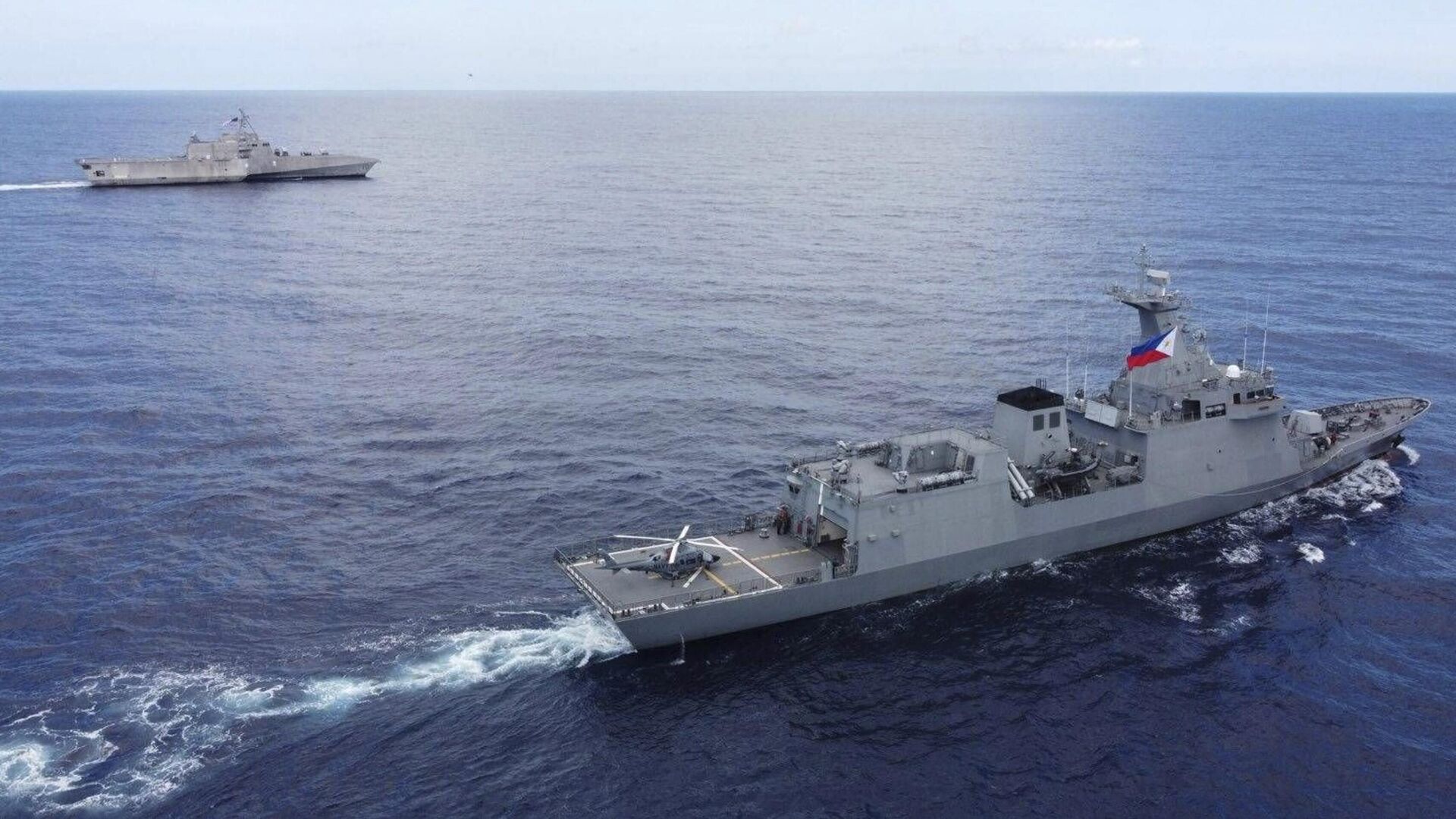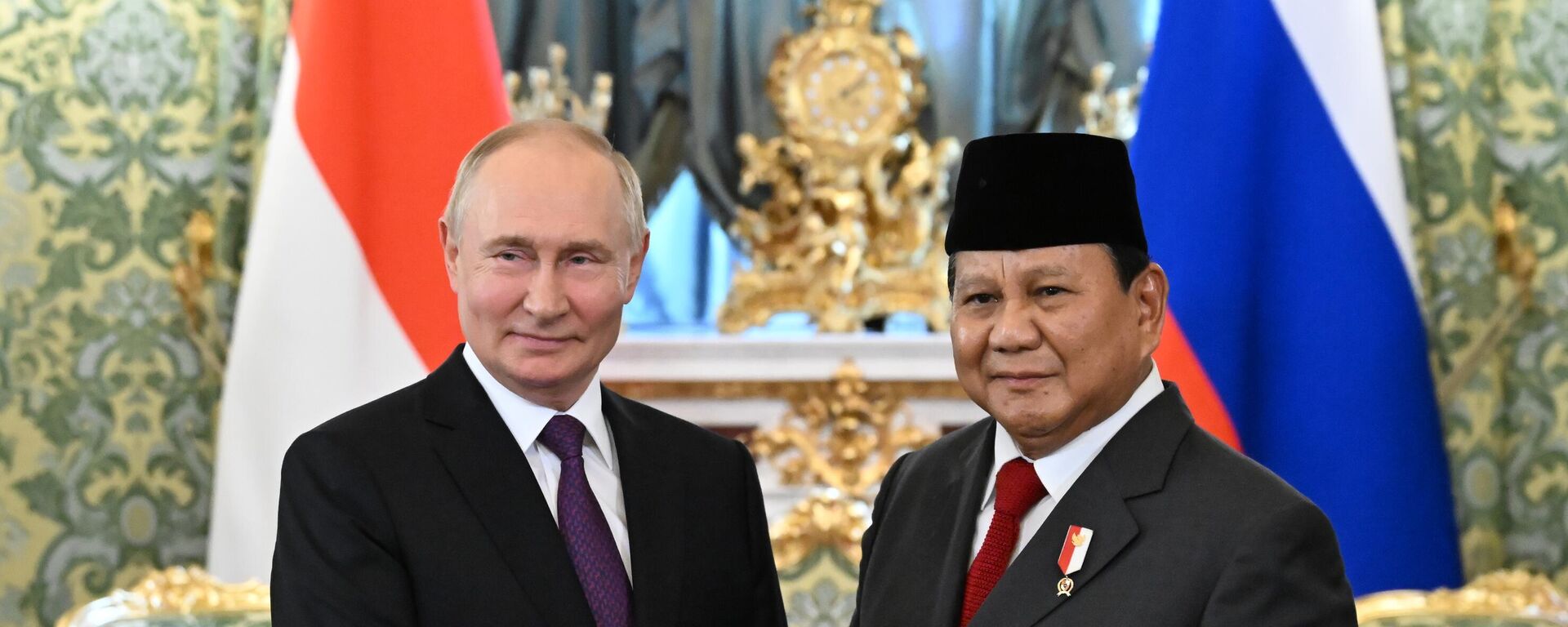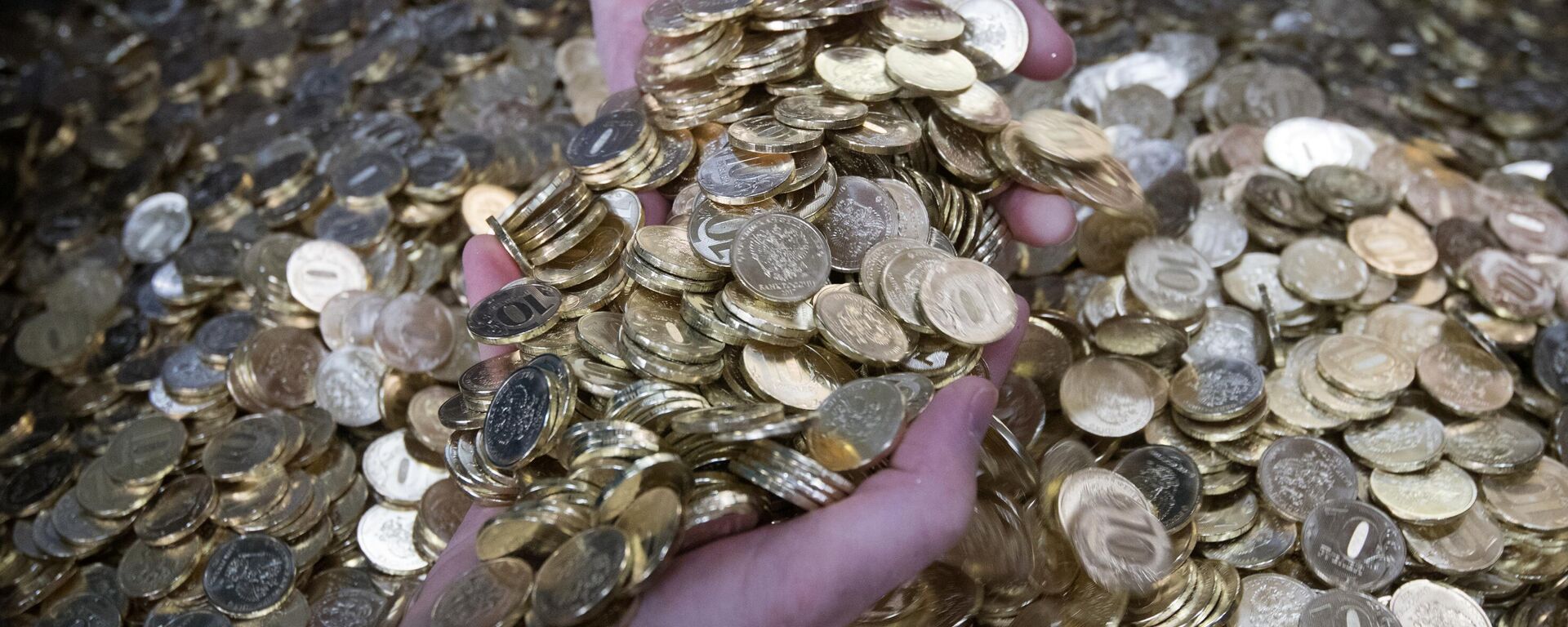https://sputnikglobe.com/20240904/us-role-in-indonesia-philippines-eyed-as-washington-maintains-anti-china-presence-in-region-1120008663.html
US Role in Indonesia, Philippines Eyed as Washington Maintains Anti-China Presence in Region
US Role in Indonesia, Philippines Eyed as Washington Maintains Anti-China Presence in Region
Sputnik International
“Jakarta has been engulfed in fiery unrest in recent days, as thousands of protesters attempted to storm parliament in response to controversial changes to election laws,” notes the website Orinoco Tribune, acknowledging large demonstrations taking place in the Indonesian capital recently.
2024-09-04T05:32+0000
2024-09-04T05:32+0000
2024-09-04T06:48+0000
world
us
joko widodo
kit klarenberg
prabowo subianto
philippines
china
indonesia
national endowment for democracy (ned)
cia
https://cdn1.img.sputnikglobe.com/img/07e8/09/04/1120010112_0:131:3408:2048_1920x0_80_0_0_95833611b2c7893e922756ea3fb4a661.jpg
“Jakarta has been engulfed in fiery unrest in recent days, as thousands of protesters attempted to storm parliament in response to controversial changes to election laws,” notes the website Orinoco Tribune, acknowledging large demonstrations taking place in the Indonesian capital recently.The online newspaper republished analysis offered one year ago by the investigative reporter Kit Klarenberg documenting “an extensive network of political, media, and civil society infrastructure” established by the CIA-linked National Endowment for Democracy to facilitate regime change in the country of 275 million people. “After years of fostering insurrectionary fervor in the country, has the NED’s influence finally reached a boiling point?” the website asks.“The US has been unhappy” with Indonesian President Joko Widodo noted writer and peace activist KJ Noh, who joined Sputnik’s The Critical Hour program Tuesday to discuss developments in the region. “They sometimes use the term ‘aggressive neutrality’ in that he has been balancing between China and the United States. So, for a very, very long time they did not want [Widodo] in power and it may be that there are more moves that are happening right now in order to depose him.”Widodo’s successor Prabowo Subianto is set to assume power next month, Noh noted, speculating that “movements on the ground” could accelerate if the United States intends to move forward with regime change.The US often implements political change in foreign countries via a process known as a “color revolution” wherein US-backed media, activists and other civil society institutions are utilized to lay the groundwork for coups, often via fomenting mass protest or insurrection.The United States is also looking to interfere in the Philippines, offering to escort Philippine supply ships to an outpost the country is maintaining in the South China Sea to lay claim to a disputed island. The Philippines has consistently maintained the outpost to keep alive its claim to the territory, supplying it with building materials even after vowing to only send food and basic supplies.“Once the US says that it is also going to start to escort these ships, then that takes the provocation to yet another level,” said the activist. “They don't have any right to that area because they have no legal jurisdiction. They have no historical rights to that area. The only thing they're trying to claim is that they have contested [exclusive economic zone] rights, which are contested with multiple other countries but that does not give them the right to squat any of the islands there, which historically have been established to be Chinese.”The Philippines aims to internationalize the issue by leveraging alliance to mislead the public. By engaging with these non-involved parties, including making some off-table trade-offs, the Philippines seeks to "enhance its bargaining power and maritime presence," said Chen Xiangmiao, director of the World Navy Research Center at the National Institute for South China Sea Studies.The US is the real "mastermind" behind the tension in the South China Sea, instructing Manila to stir up trouble but avoiding a scenario that goes out of control, and it is also the US that has mobilized its close allies to back the Philippines, Chen said.
https://sputnikglobe.com/20240731/indonesia-views-russia-great-friend-seeks-to-further-develop-relations---president-elect-1119580834.html
https://sputnikglobe.com/20240503/saudi-arabia-and-indonesia-lobby-eu-to-halt-russian-asset-confiscation-1118238877.html
philippines
china
indonesia
Sputnik International
feedback@sputniknews.com
+74956456601
MIA „Rossiya Segodnya“
2024
John Miles
https://cdn1.img.sputnikglobe.com/img/07e8/01/19/1116388787_0:0:1316:1316_100x100_80_0_0_77e70d36afd983012b1c5d38ddb84156.jpg
John Miles
https://cdn1.img.sputnikglobe.com/img/07e8/01/19/1116388787_0:0:1316:1316_100x100_80_0_0_77e70d36afd983012b1c5d38ddb84156.jpg
News
en_EN
Sputnik International
feedback@sputniknews.com
+74956456601
MIA „Rossiya Segodnya“
Sputnik International
feedback@sputniknews.com
+74956456601
MIA „Rossiya Segodnya“
John Miles
https://cdn1.img.sputnikglobe.com/img/07e8/01/19/1116388787_0:0:1316:1316_100x100_80_0_0_77e70d36afd983012b1c5d38ddb84156.jpg
us indonesia color revolution, us ned cia interference indonesia, us interference philippines, us china provocation south china sea, us philippines provocation against china, south china sea dispute, south china sea
us indonesia color revolution, us ned cia interference indonesia, us interference philippines, us china provocation south china sea, us philippines provocation against china, south china sea dispute, south china sea
US Role in Indonesia, Philippines Eyed as Washington Maintains Anti-China Presence in Region
05:32 GMT 04.09.2024 (Updated: 06:48 GMT 04.09.2024) The United States has continuously worked to provoke and contain China, identifying the Asian country as a major threat to its global hegemony.
“Jakarta has been engulfed in fiery unrest in recent days, as thousands of protesters attempted to storm parliament in response to controversial changes to election laws,” notes the website Orinoco Tribune, acknowledging large demonstrations taking place in the Indonesian capital recently.
The online newspaper republished analysis offered one year ago by the investigative reporter Kit Klarenberg documenting “an extensive network of political, media, and civil society infrastructure” established by the CIA-linked National Endowment for Democracy to facilitate regime change in the country of 275 million people. “After years of fostering insurrectionary fervor in the country, has the NED’s influence finally reached a boiling point?” the website asks.
“The US has been unhappy” with Indonesian President Joko Widodo noted writer and peace activist KJ Noh, who joined
Sputnik’s The Critical Hour program Tuesday to discuss developments in the region.
“They sometimes use the term ‘aggressive neutrality’ in that he has been balancing between China and the United States. So, for a very, very long time they did not want [Widodo] in power and it may be that there are more moves that are happening right now in order to depose him.”
“Certainly, we know that Widodo has been in the crosshairs of the United States for a while,” the analyst claimed.
Widodo’s successor Prabowo Subianto is set to assume power next month, Noh noted, speculating that “movements on the ground” could accelerate if the United States intends to move forward with regime change.
The US often implements political change in foreign countries via a process known as a “color revolution” wherein US-backed media, activists and other civil society institutions are utilized to lay the groundwork for coups, often via fomenting mass protest or insurrection.
The United States is also looking to interfere in the Philippines, offering to escort Philippine supply ships to an outpost the country is maintaining in the South China Sea to lay claim to a disputed island. The Philippines has consistently maintained the outpost to keep alive its claim to the territory, supplying it with building materials even after vowing to only send food and basic supplies.
“They want to see if they can create a provocation,” Noh said of the US’s offer of assistance to the Philippines. “The Philippines made a promise to China to remove the rusting ship the Sierra Madre. They broke that promise, they've been resupplying it and then they said that they would only resupply food… and water, and then it turns out that they were trying to resupply building materials, etcetera. Once again, to kind of squat the Second Thomas Shoal and to establish it as they're trying to claim squatter’s rights.”
“Once the US says that it is also going to start to escort these ships, then that takes the provocation to yet another level,” said the activist. “They don't have any right to that area because they have no legal jurisdiction. They have no historical rights to that area. The only thing they're trying to claim is that they have contested [exclusive economic zone] rights, which are contested with multiple other countries but that does not give them the right to squat any of the islands there, which historically have been established to be Chinese.”
The Philippines aims to internationalize the issue by leveraging alliance to mislead the public. By engaging with these non-involved parties, including making some off-table trade-offs, the Philippines seeks to "enhance its bargaining power and maritime presence," said Chen Xiangmiao, director of the World Navy Research Center at the National Institute for South China Sea Studies.
The US is the real "mastermind" behind the tension in the
South China Sea, instructing Manila to stir up trouble but avoiding a scenario that goes out of control, and it is also the US that has mobilized its close allies to back the Philippines, Chen said.





